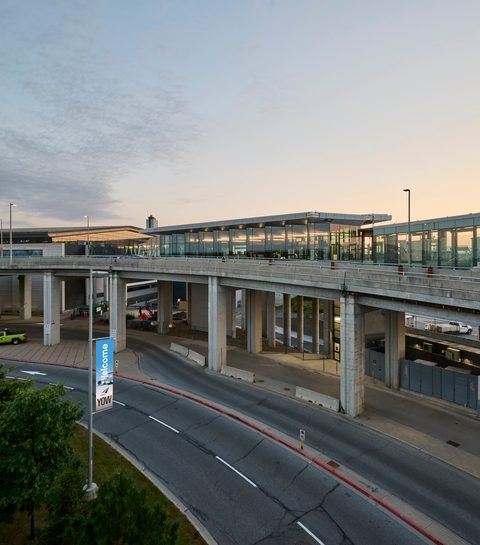Canada’s Airports Reinforce Call for Government Action as Expected Losses Grow with New Travel Restrictions
Published on March 4, 2021


Issued by the Canadian Airports Council
Airports expect an additional $1 billion in lost revenues as a result of new travel restrictions and extended traffic suppression
Canada’s airport are calling on federal and provincial governments to work with airports and other industry stakeholders as a matter of urgency if our country is to emerge from the pandemic with a functioning air sector that supports Canadian travel, tourism and trade. The air sector needs a plan that will reverse domestic and international travel restrictions when the time is right, and ensure Canada has a strong, competitive air sector on the other side of this crisis.
With the increase in air travel restrictions, and new quarantine and testing requirements imposed during the last quarter of 2020 and early 2021, the Canadian Airport Council’s December outlook projects that revenue losses for Canada’s airports have deepened to $5.5 billion for 2020 and 2021 – a $1 billion deterioration since the last analysis was released in August. Given that no more than 20 percent of the measures outlined in the federal Fall Economic Statement will come in the form of direct grants to address operational losses, Canada’s airports expect to take on about $2.8 billion in additional debt in 2020 and 2021.
Daniel-Robert Gooch, president of the Canadian Airports Council is worried that the effects will be permanent. “While the federal government has been supportive, it is missing the sense of urgency to act quickly and decisively. The reality is that these losses are unsustainable. Without government action, air travel will not only become a lot more expensive, but Canadians everywhere will have fewer choices of routes and destinations, including at the four major hub airports.”
Prior to the onset of COVID-19, the majority of Canada’s airports were almost entirely funded through passenger and aeronautical fees, which have dropped catastrophically with passenger traffic at zero to 15 per cent of pre-COVID levels at most airports. Unfortunately, the government’s mitigations such as ground lease rent relief and the Canada Emergency Wage Subsidy provided only minimal aid.
“These measures provided some assistance, but not enough to help support airports dealing with higher costs and cratering revenues,” Mr. Gooch said. “In fact, our analysis shows that even their modest impact was far less than the government projected.”
When the 2020 rent waiver was announced in March the government asserted that it would provide the equivalent of $330 million in relief to the airport sector. The CAC’s data, aggregated directly from airports, show that the waiver saved only $137 million, 90 per cent of which benefited just four airports. Moreover, the majority of Canadian airports pay no rent, so most airports saw no benefit from the waiver at all.
Similarly, the Canada Emergency Wage Subsidy (CEWS) provided $139 million in support to airports in 2020 – a fraction of the $1.7 billion that the federal government says has been provided to “air sector workers” – with 84 per cent going to the four busiest airports. Moreover, about 200 municipal airports in Canada are not even eligible to participate in the program.
If the government does not increase its support, airports will have no choice but to make some stark choices that will have a direct impact on their passengers and communities. They can raise their fees significantly, continue to take on unprecedented amounts of new debt, or reduce operations even more dramatically.
To complicate matters further, air travel is very price-sensitive and airports must compete with each other for service. If their rates increase too much, air carriers may elect not to return or may do so at fares that are no longer competitive, driving Canadians to fly on foreign air carriers and out of American airports as part of a vicious spiral that further degrades air connectivity for Canadian communities.
The CAC has identified a number of government-led actions to avoid the worst of these outcomes, including
- Working inclusively with Canada’s airports and industry partners on a plan to safely restart air travel when it is safe to do.
- Implementing a moratorium on ground lease rents and provide options for interest-free loans (or equivalent operational support) until the business recovers, which could take five years or longer.
- Expanding national transportation infrastructure funding to meet safety and security requirements and adapt to COVID-19 and climate change.
- Making permanent the elevated Airports Capital Assistance Program funding and expanded eligibility criteria to ensure sustainable recovery at Canada’s regional airports.
"Since the outset of the pandemic, airports have worked with transport, border and public health officials, among others, to ensure that air travel is as healthy and safe as possible and to continue to provide essential and emergency services for Canadians,” said Mr. Gooch. “We look forward to working with our government colleagues to rebuild confidence in air travel and save the industry from long term and irreparable damage.
-30 -
About the Canadian Airports Council
The Canadian Airports Council (CAC), a division of Airports Council International-North America, is the voice for Canada’s airports community. Its 54 members represent more than 100 airports, including all of the privately operated National Airports System (NAS) airports and many municipal airports.
Canada’s locally managed and not for profit airports are essential community assets. In 2019, they supported 194,000 direct jobs, contributed $19 billion to GDP and $48 billion in direct economic outputs. They also remitted $6.9 billion in taxes to municipal, provincial and federal governments.
For more information, please contact:
